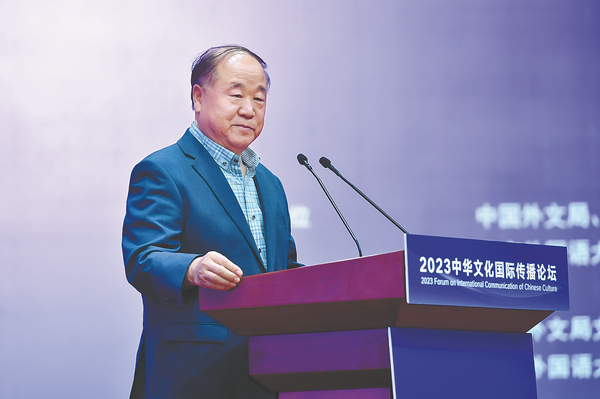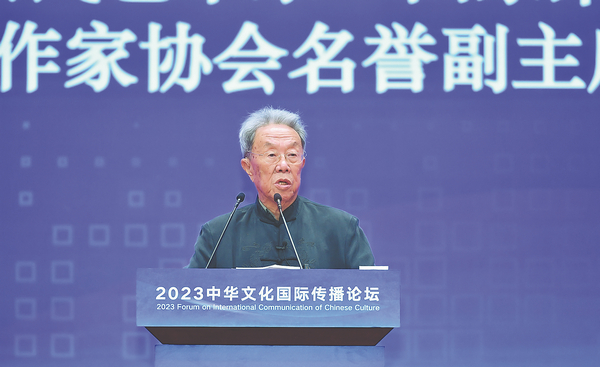

The importance of building a modern Chinese civilization and promoting exchange and mutual learning between civilizations was highlighted at the 2023 Forum on International Communication of Chinese Culture held recently in Beijing.
Around 400 local and overseas officials and cultural experts attended the forum on Sept 22 to discuss how to better implement the Global Civilization Initiative and how civilization can make greater progress.
Du Zhanyuan, president of the China International Communications Group, said that the forum aimed to look at Chinese culture from a global view, and deepen mutual learning among civilizations, so that the significance of Chinese culture, as well as China's past, present and future, can be better recognized, spread and understood.
The group's Center for International Cultural Communication was one of the three organizers of the forum.
Nobel laureate Mo Yan recalled his experiences of joining cultural exchanges in Japan and Kenya. He told the forum such exchanges bring innovation, and that mutual learning and localization of foreign and fine cultural elements inspire unique styles of art.
Mo Yan said that these days a younger generation of Sinologists has been paying more attention to the literary quality and universal values of Chinese literature. They are willing to translate and introduce these works, which expound on human nature and the shared pursuit of a better life, to the world.
"A writer fully expresses his mind and values in his writing. When his inner thoughts and value concepts are in accordance with those of the readers, his work will naturally have a universality," Mo Yan said.
Sinologist Roger Thomas Ames, Humanities Chair Professor at Peking University and vice-president of the Beijing-based International Confucian Association, said that when cultural equality is achieved and cultural differences are treated fairly and inclusively, there will be mutual accommodation among different ways of living and thinking. Through this process more diversity can be generated.
Diversity can only be achieved by fully acknowledging, acting on, and appreciating the important differences we have from each other. "And in so doing, (it) allows our differences to really make the difference," Ames said.

Wang Meng, 89, said that China has overcome the identity crisis that developing countries often encounter during the modernization process, maintained its stability and traditions, and realized the creative transformation and innovative development of its culture.
The renowned writer and former culture minister added that China has outlined its deep concern for creating a community with a shared future for mankind, and its understanding of the diversity and autonomy of different countries' paths toward modernization.
Therefore, proposing a model that involves cooperation and mutual benefits shows the nation's responsibility and reasonable recognition of the profound changes to the world, Wang said.
Yang Dan, principal of the Beijing Foreign Studies University, whose Academy for International Communication of Chinese Culture also served as one of the forum's organizers, stressed the need to enhance regional and country-specific studies with an open, inclusive and multilateral perspective.
He said that cultural experts should take the initiative to voice China's standpoints with an international perspective, consciously integrate the studies of China's past with those of the present, and actively cooperate with international scholars.
Zhu Rui, former assistant to the minister of the International Department of the Communist Party of China Central Committee, called for more coordination of forums on cultural exchange and mutual learning, so that a series of diverse, but interconnected events, can be held to generate more wisdom on implementing the Global Civilization Initiative.